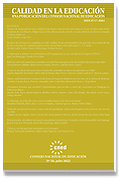Academic Engagement among University Students from the Higher Education Access Program (PACE) in Chile
DOI:
https://doi.org/10.31619/caledu.n56.1159Keywords:
academic engagement, academic disengagement, propaedeutic pathways, school-university transition programs, socioeconomic inequality, student dropout and retentionAbstract
The Superior Education Access Program (PACE: Programa de Acceso a la Educación Superior) in Chile is an initiative that aims to provide a better possibility for equity in the access to higher education for students from less wealthy backgrounds and to promote persistence in their studies. Economically disadvantaged students are at greater risk of dropping out. Therefore, the study of variables intervening in dropout is a major concern to the Program.
The academic engagement construct offers predictive insights into academic achievement and student attrition. Evidence about the characteristics of student engagement in vulnerable populations is mixed, with some researchers claiming that such students show higher engagement when entering university while others disagree. This investigation aims to compare the academic engagement and disengagement between PACE students in their first year and their first-year peers at Universidad de Concepción in Chile.
The study findings show a significantly higher emotional engagement in PACE students, suggesting a deeper affective attachment with their educational institution and a lower behavioral disengagement. That is, students are more respectful to the institutional norms.
Downloads
Published
Issue
Section
License
Authors retain their Copyright and only transfer a part of these to the journal, accepting the following conditions:
Authors keep their rights as authors and guarantee the right to the journal for the first publication of their work, which is simultaneously subject to the Creative Commons Attribution license allowing third parties to share the study accrediting the author and first publication in this journal.
Authors may adopt other non-exclusive license agreements for distribution of the version of the published work (e.g. inclusion in an institutional thematic file or publication in a monographic volume) accrediting initial publication in this journal.
Authors are allowed and recommended to share their work over the Internet (e.g. in institutional telematic files or their website) before and during the submission process, which may lead to interesting exchanges and increased citation of the published work. (See The effect of open access).

